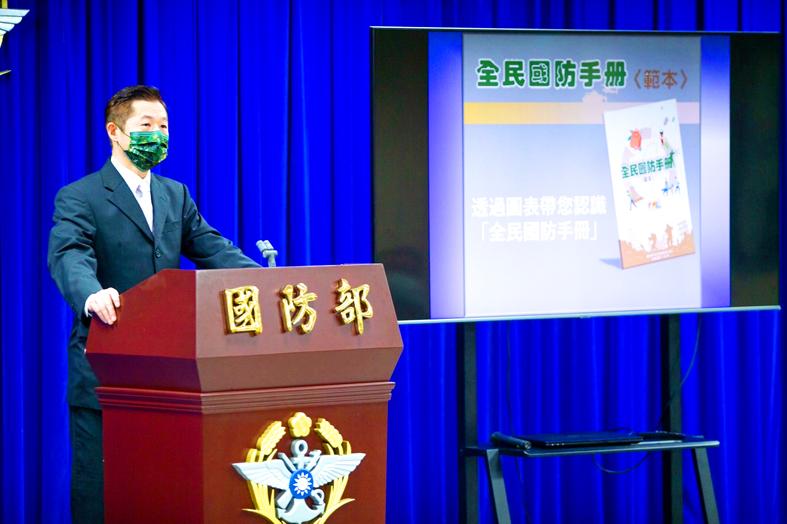The Ministry of National Defense has released a civil defense handbook aimed at informing Taiwanese how to seek refuge in major nationwide emergencies, including a military conflict, to be better prepared for various contingencies.
The 28-page Chinese-language handbook contains QR codes for users to scan to access directions for where to go and what to do in a major emergency, All-out Defense Mobilization Agency Director Liu Tai-yi (劉泰益) said at a news conference in Taipei yesterday.
The pamphlet outlines safety measures for civilians during an air raid, major fire, building collapse, major power outage, water shortage or shortage of essential goods, explains basic survival skills and offers an emergency hotline people can call, Liu said.

Photo courtesy of the Ministry of Defense via CNA
It also has a section on combat preparedness and wartime reserve force mobilization that provides a general guide on where reservists would have to report should a war break out, he said.
The ministry said that it has been working on the project since last year, and took into consideration information from similar handbooks issued by the Swedish and Japanese governments, as well as inputs from local governments, academics and experts.
The handbook is being issued amid concerns over China’s intentions toward Taiwan and the possibility that it could launch a cross-strait conflict.
It is available to download at https://www.mnd.gov.tw/Publish.aspx?title=國防消息&p= 79745&SelectStyle=公告專區.
In related news, the ministry early yesterday morning held an air defense drill to test the readiness of the military against an aerial attack.
The exercise, which ran from 5am to 7am, was conducted primarily to test the defensive capabilities and combat readiness of operational ground troops, the ministry said, without further elaboration.
Tthe aircraft used in the simulated air attack included F-16s, Indigenous Defense Fighters and AH-64E Apache attack helicopters, said a military official who asked not to be named.
The aircraft flew sorties over areas around Taipei without prior warning to verify the responsiveness of the nation’s air defense forces, the official said, and the drill was held early in the morning to avoid interfering with civilian aircraft.
It was an important test of the readiness of the military in the event of an aerial attack from China, the official added.

MAKING WAVES: China’s maritime militia could become a nontraditional threat in war, clogging up shipping lanes to prevent US or Japanese intervention, a report said About 1,900 Chinese ships flying flags of convenience and fishing vessels that participated in China’s military exercises around Taiwan last month and in January have been listed for monitoring, Coast Guard Administration (CGA) Deputy Director-General Hsieh Ching-chin (謝慶欽) said yesterday. Following amendments to the Commercial Port Act (商港法) and the Law of Ships (船舶法) last month, the CGA can designate possible berthing areas or deny ports of call for vessels suspected of loitering around areas where undersea cables can be accessed, Oceans Affairs Council Minister Kuan Bi-ling (管碧玲) said. The list of suspected ships, originally 300, had risen to about 1,900 as

DAREDEVIL: Honnold said it had always been a dream of his to climb Taipei 101, while a Netflix producer said the skyscraper was ‘a real icon of this country’ US climber Alex Honnold yesterday took on Taiwan’s tallest building, becoming the first person to scale Taipei 101 without a rope, harness or safety net. Hundreds of spectators gathered at the base of the 101-story skyscraper to watch Honnold, 40, embark on his daredevil feat, which was also broadcast live on Netflix. Dressed in a red T-shirt and yellow custom-made climbing shoes, Honnold swiftly moved up the southeast face of the glass and steel building. At one point, he stepped onto a platform midway up to wave down at fans and onlookers who were taking photos. People watching from inside

Japan’s strategic alliance with the US would collapse if Tokyo were to turn away from a conflict in Taiwan, Japanese Prime Minister Sanae Takaichi said yesterday, but distanced herself from previous comments that suggested a possible military response in such an event. Takaichi expressed her latest views on a nationally broadcast TV program late on Monday, where an opposition party leader criticized her for igniting tensions with China with the earlier remarks. Ties between Japan and China have sunk to the worst level in years after Takaichi said in November that a hypothetical Chinese attack on Taiwan could bring about a Japanese

The WHO ignored early COVID-19 warnings from Taiwan, US Deputy Secretary of Health and Human Services Jim O’Neill said on Friday, as part of justification for Washington withdrawing from the global health body. US Secretary of State Marco Rubio on Thursday said that the US was pulling out of the UN agency, as it failed to fulfill its responsibilities during the COVID-19 pandemic. The WHO “ignored early COVID warnings from Taiwan in 2019 by pretending Taiwan did not exist, O’Neill wrote on X on Friday, Taiwan time. “It ignored rigorous science and promoted lockdowns.” The US will “continue international coordination on infectious